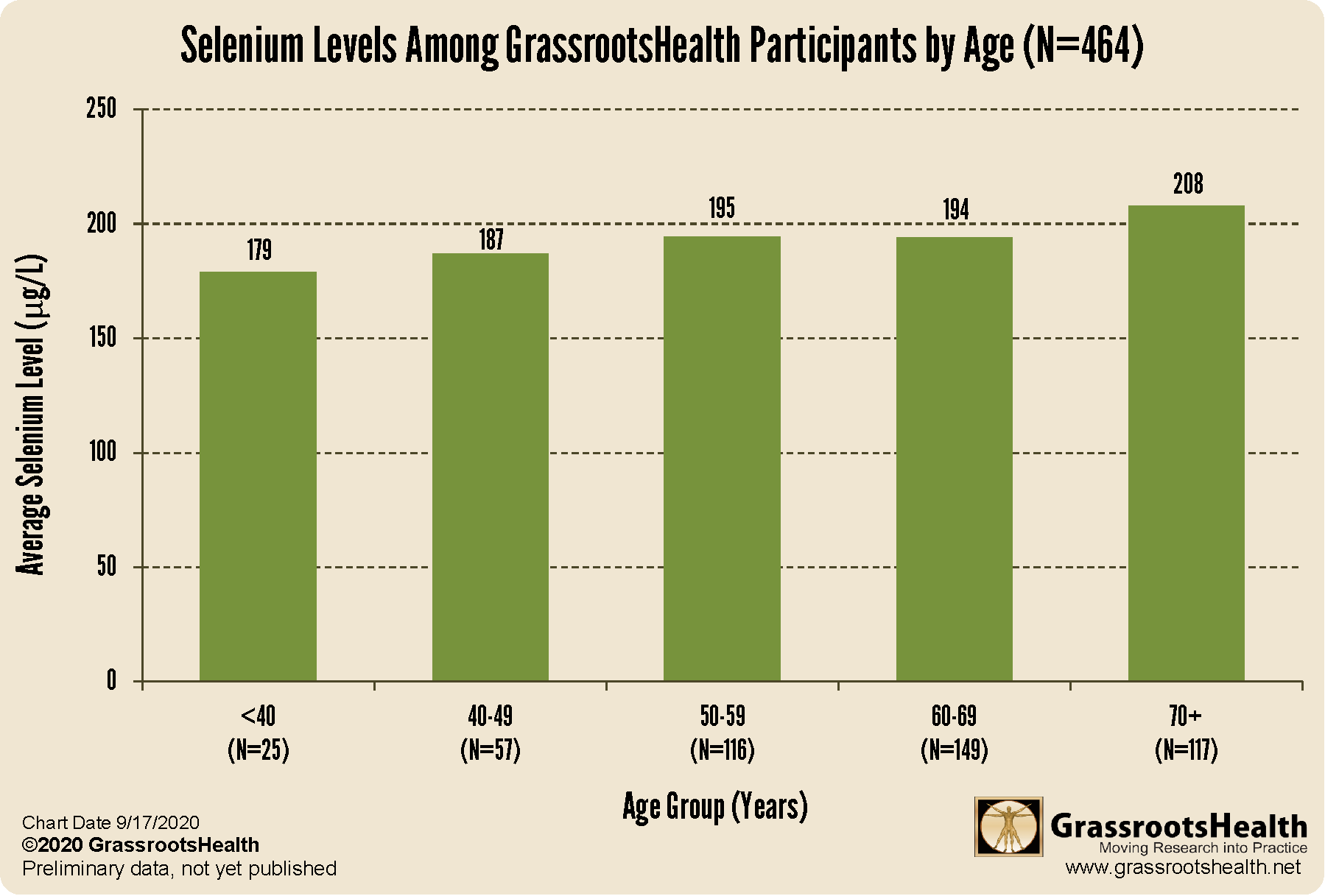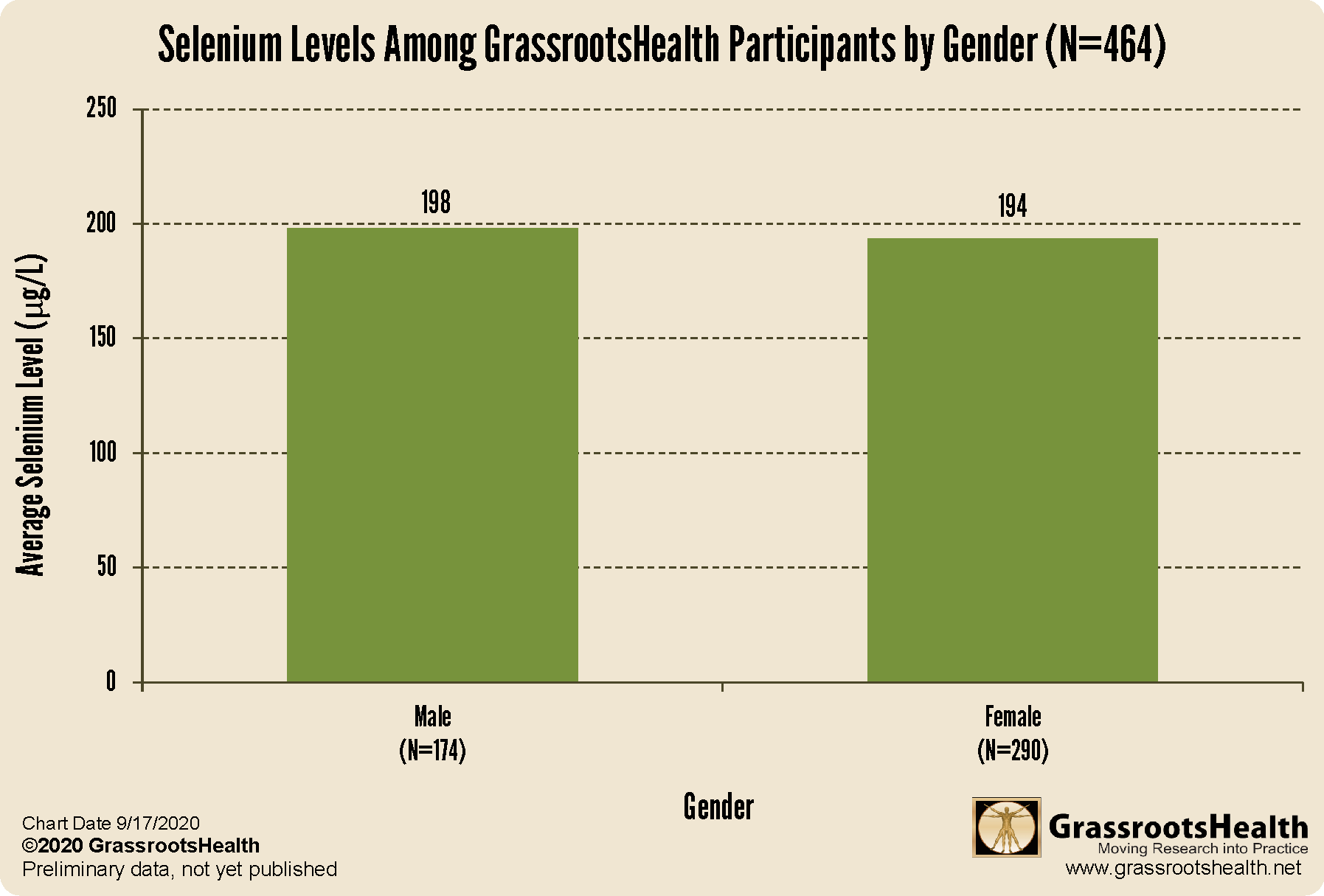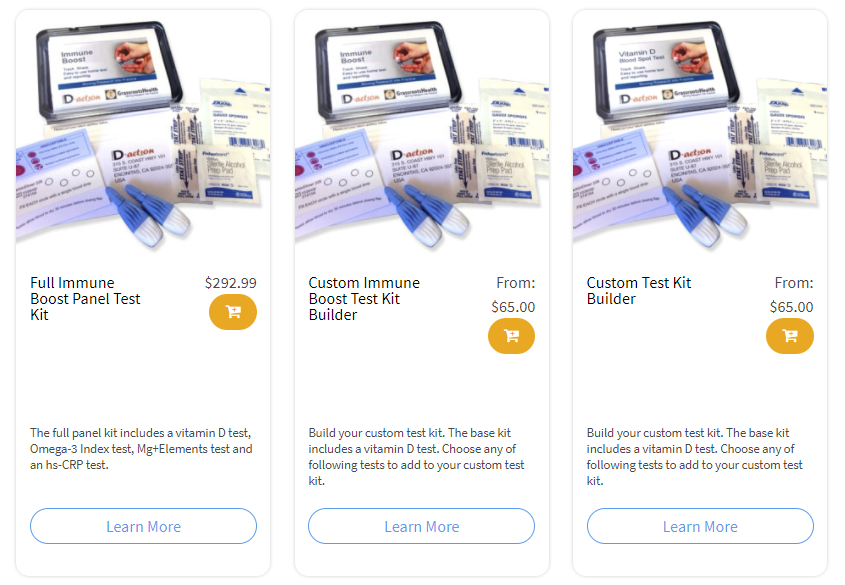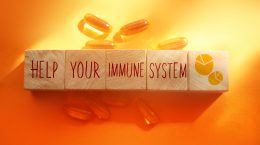Published on September 29, 2020
GrassrootsHealth participant selenium levels broken down by age and gender
 Selenium is an essential nutrient with antioxidant properties that plays a key role in thyroid function, reproduction, and DNA synthesis. It is involved in T cell proliferation and antibody production. Selenium is also an integral component of two antioxidant enzymes, glutathione peroxidase and thioredoxin reductase, that protect immune cells from oxidative damage. Additionally, selenium influences the production of cytokines and eicosanoids — chemical messengers that regulate inflammation and immune cell function. Studies have found an association between higher selenium status and a lower risk of cancer, cognitive decline, and cardiovascular disease.
Selenium is an essential nutrient with antioxidant properties that plays a key role in thyroid function, reproduction, and DNA synthesis. It is involved in T cell proliferation and antibody production. Selenium is also an integral component of two antioxidant enzymes, glutathione peroxidase and thioredoxin reductase, that protect immune cells from oxidative damage. Additionally, selenium influences the production of cytokines and eicosanoids — chemical messengers that regulate inflammation and immune cell function. Studies have found an association between higher selenium status and a lower risk of cancer, cognitive decline, and cardiovascular disease.
Selenium is a mineral present naturally in water and some foods including Brazil nuts, walnuts, grains, beef, poultry, and some seafood. Selenium is also available as a dietary supplement. Click here to find out more about selenium.
In a previous post we looked at the selenium levels among GrassrootsHealth participants. Today we will look at selenium levels broken down by age and gender.
Selenium Levels by Age Among GrassrootsHealth Participants
The chart below shows the average selenium levels by age group, which shows an upward trend for selenium levels with increasing age, similar to the trend we saw with zinc levels.
Selenium Levels by Gender Among GrassrootsHealth Participants
The chart below shows the average selenium levels by gender, which shows that male participants have a slightly higher average level than female participants.
The laboratory reference range for selenium, which indicates the range of typical results found in the population served by the lab, is 132 to 247 μg/L. While higher selenium status has been associated with reduced disease risk, the optimal range for health is not known. Excess selenium can cause nausea, diarrhea, neurological symptoms, and heart problems so it’s important to identify this optimal range. Your ongoing participation in this project will contribute greatly to knowing what levels are optimal for health. Test your selenium levels today as part of the Elements Panel, which includes testing your vitamin D level along with essential elements magnesium, selenium, zinc, copper, and copper:zinc ratio, and toxic heavy metals cadmium, lead, and mercury.
Could Nutrients Help Improve Your Immune Response?
Could getting more of certain nutrients help to decrease your levels of inflammation and improve your immune response? Find out by testing your vitamin D, omega-3s, magnesium and other essential elements (including copper and zinc), as well as your inflammation levels, with the new Immune Boost home test kit offered by GrassrootsHealth. Measuring levels is the only way to know if you are supporting your immune system and whether additional changes should be made, with supplementation, dietary changes, or both.
Enroll now with the Full Immune Boost Panel (which includes tests for vitamin D, Omega-3 Index, magnesium, zinc, selenium, copper, and hsCRP), and get 10% off when you use coupon code BoostTen at checkout.
What Does it Take YOU to Get Your D to 40 ng/ml (100 nmol/L)?
Did you know your health could be greatly affected by making sure you have a vitamin D level of at least 40 ng/ml (100 nmol/L)? Help us help you.
STEP 1 – Do you know what your vitamin D level is? If not, be sure to test today to find out.
STEP 2 – Determine your target level. Are you at your target level? Experts recommend a level of at least 40-60 ng/ml (100-150 nmol/L).
STEP 3 – Need to boost your level? Use the D*calculator to see how much vitamin D it may take to reach your target. Opt for the Loading Dose for a quicker boost.
STEP 4 – Optimize how your body absorbs and utilizes vitamin D with co-nutrients and these simple steps.
STEP 5 – Re-Test! This is an important step to make sure you have reached your target level, and to ensure you are not taking too much! Re-testing after 3-4 months is recommended.
STEP 6 – Adjust, Repeat…
Give your immune system the nutrients it needs to support a healthy you and protect yourself from unnecessary diseases, especially COVID-19.
NEWS ALERT
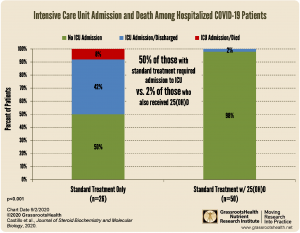 The first Randomized Controlled Trial on vitamin D and COVID-19 has shown a 96% lower risk of ICU admission for those receiving vitamin D (as 25(OH)D to quickly boost vitamin D blood levels) along with the standard treatment, compared to those receiving standard treatment alone.
The first Randomized Controlled Trial on vitamin D and COVID-19 has shown a 96% lower risk of ICU admission for those receiving vitamin D (as 25(OH)D to quickly boost vitamin D blood levels) along with the standard treatment, compared to those receiving standard treatment alone.
These results support many previous observational studies showing a relationship between vitamin D levels and intake and COVID-19 severity.
Review the Latest Nutrient Research for COVID-19
GrassrootsHealth Nutrient Research Institute has launched the new Immune Boost project with the use of our myData-myAnswers nutrient health system that nearly 15,000 people are already using for their health. Specific markers that influence immune health are suggested for testing as part of this project including:
- Vitamin D
- Omega-3 Index
- Essential elements magnesium, selenium, and zinc
- hsCRP
Our goal is to demonstrate how one can use the Nutrient Research Model established by Dr. Robert Heaney to show the effect of vitamin D serum levels of at least 40 ng/ml (100 nmol/L) on risk reduction for all ethnicities in the population. Status and intake of other nutrients will also be analyzed for any type of relationship to immune status and symptom severity. Join the project today!
Please let us know if you’re interested in helping sponsor this project.
CLICK HERE for updates and new information about the project.
Through GrassrootsHealth Nutrient Research Institute, you can also test your essential elements magnesium, copper, zinc and selenium, toxins such as lead, mercury and cadmium, as well as your omega-3 levels, inflammation levels and thyroid stimulating hormone (TSH) level. Find out your levels today! Log on to the test selection page (click the link below) to get your tests and see for yourself if your levels can be improved.
Make sure you track your results before and after, about every 6 months!
Click Here to Access the Test Page
How can I track my nutrient intake and levels over time?
To help you track your supplement use and nutrient levels, GrassrootsHealth has created the Personal Health Nutrient Decision System called
For each specific supplement, you can track what days you take it, how much, and many other details. This will help you know your true supplemental intake and what patterns of use work for you to reach and maintain optimum nutrient levels. Check it out today!


